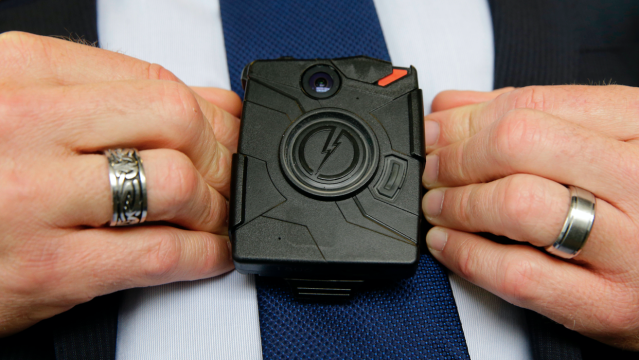Body camera manufacturer Axon requested a contract for face recognition software from an artificial intelligence startup, The Wall Street Journal reports, which stands to further fears from privacy advocates about the state of surveillance.
Photo: AP
In a report on the future of privacy and face recognition, WSJ spoke with Brian Brackeen, CEO of Kairos, a startup specialising in both AI and face recognition. Brackeen claims Axon requested the startup’s face recognition software, but Kairos declined.
The Wall Street Journal writes:
Dozens of startups offer … face-recognition services. One such startup, Kairos, refuses to sell its technology to governments or their contractors, says CEO Brian Brackeen. Among the contracts he says his company has refused was a request for a face-recognition system by Axon Enterprise Inc., formerly Taser International, a maker of police body cameras and electroshock weapons.
WSJ also reports that an unnamed company requested to use Kairos’ technology in drones. Axon was not named, though we’ve asked the company to clarify if its talks with Kairos including the use of face recognition in drones.
When Gizmodo reached out for comment, an Axon spokesperson asserted that the company “is not developing facial recognition technology”, but added that “we do see the value in this future capability” while recognising the privacy and rights issues involved in such a use. The spokesperson wrote in an email:
As a technology company, Axon is constantly evaluating all different technologies in order to be current in our understanding of their capabilities. These discussions are not an endorsement of any technology nor an indication we are going to use this technology in our line of products. At this point in time, Axon is not developing facial recognition technology.
To clarify, we stand by our statement provided to you previously: While we are not actively working on facial recognition at this time, we do see the value in this future capability. We also understand the potential issues around privacy rights and risks associated with mis-identification of individuals. That is why we chose to assemble an AI Ethics Board to help us understand both the risks and benefits before we begin to develop such technologies.
Axon established an AI Ethics Board in May, though it’s unclear if board members were aware of the company’s talks with Kairos.
Axon is the leading supplier of varying police technologies in the United States. Formerly named Taser International, the company was the largest provider of its signature Taser stun guns.
Since its rebranding, Axon became the leading vendor of body cameras, acquiring its leading competitor, Vievu, earlier this year and offering a controversial free year-long trial of the cameras to any police department.
The free cameras also came fully integrated with Evidence, Axon’s proprietary cloud management system used to store and edit body camera footage.
Which brings us back to face recognition. In 2017, Axon began acquiring computer vision start-ups, hugely enhancing police agencies’ ability to sort through enormous amounts of footage.
At the time, Axon claimed it only planned to use computer vision for automated redaction. With this feature, AI automatically edited out the faces and voices of people captured in the footage.
But applying AI to body camera footage immediately concerned privacy advocates, who warned that enabling face recognition in body cameras would mean police could essentially perform ID checks on anyone, anytime, anyplace.
Police are already using face recognition. In May, the American Civil Liberties Union released internal emails detailing Amazon’s work on Rekognition, its face recognition technology, which the company has supplied to police departments.
The ACLU’s investigation found that police had used Amazon’s face recognition technology to match suspects and witnesses against mugshot databases.
Body cameras came up in these talks, when a Washington County police official asked Amazon employees for help with “people challenges”, referring to a potential public backlash to cams integrated with face recognition technology.
In response, Amazon employees have campaigned for CEO Jeff Bezos to end the company’s partnerships with law enforcement.
Axon has repeatedly denied all claims that it is researching face recognition technology, but it’s important to emphasise what a gamechanger such a development would be, were it or another company to move in that direction.
Last year, the company unveiled the “Axon Citizen” product, which lets the public securely send video footage to police agencies. In June, Axon partnered with DJI to offer drones integrated with Evidence to police.
Privacy advocates warn of a future where officers could apply face recognition to footage from so many varying sources, from drones overhead to CCTV footage to police officers’ cameras to the footage uploaded from the public.
[WSJ]
